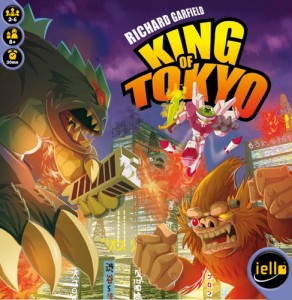 I enjoy watching Mystery Science Theater 3000 movies. I just loved the idea that people doing the same thing I do while watching a bad movie, minus the two talking robots of course. One of the genres that was always full of good laughs was the giant monster movies. From the ones I have seen, I think that Japan has the worse luck imaginable. Any time a movie involves a large creature that decided to arise from the depths of the sea, a creature awakened by a volcanic eruption, or an alien from space, the county they usually go after is Japan.
I enjoy watching Mystery Science Theater 3000 movies. I just loved the idea that people doing the same thing I do while watching a bad movie, minus the two talking robots of course. One of the genres that was always full of good laughs was the giant monster movies. From the ones I have seen, I think that Japan has the worse luck imaginable. Any time a movie involves a large creature that decided to arise from the depths of the sea, a creature awakened by a volcanic eruption, or an alien from space, the county they usually go after is Japan.
When I heard about the game King of Tokyo, I thought these old movies had to be a part of the design process. Each player takes the role of a giant monster that is trying to be the last monster standing and rule Tokyo. Will the game be able to rule this city or should it be pushed back to the depths from which it game? King of Tokyo is a 2-6 player dice rolling game designed by Richard Garfield that plays in about 45 minutes We have found that King of Tokyo plays best with 3-5 players.
Game Overview:
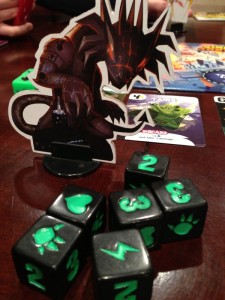
The game starts with the city of Tokyo quietly going about its business when all of a sudden giant monsters appear all at the same time. Apparently there was some sort of mix up in scheduling and this caused all the monsters to show up simultaneously…or at least that is what I think happened. Since these monstrosities don’t play well together, they proceed to fight over the city to see who will be the King of Tokyo. Players will roll dice to determine what their monster will do on each turn. They can attack other players, gain energy cubes to buy improvements, heal, or go on a rampage to earn victory points all in the hopes of being the monster that will claim this city for the last time. The game will continue until one player is the last monster standing or causes enough destruction by earning 20 victory points to rule Tokyo.
Game Components:
The components in this game a very good. If you have ever wanted good looking cartoon cutout figures, then this might be the game for you. Each one looks very menacing as it moves on and off the detailed Tokyo city board. Overall the artwork in the game was very impressive. The game also comes with eight custom dice for the players to roll on their turn. They are good quality and larger than most dice, but I think they are almost too large. I had some issues rolling them all because of their size.
The game also comes with monster board to keep track of your monsters health and victory points. Each monster board is artfully illustrator and has a set of dials for point and health tracking. While they may look cool, I feel that these are not the best way to keep track of stuff in any game. If they move too easily, you can lose track of your total and the dials are on the loose side. Despite the dials and the dice, the overall components are very high quality and nice to look at.
How to Play:
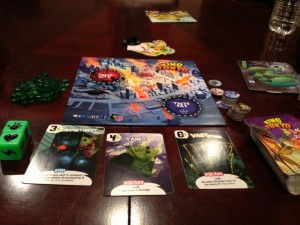
The game starts with each player deciding on which monster they want to play. All of the monsters have no distinguishing characteristics from one another. So choose the one of the six options that you like the best, like Gigazaur, Mega Dragon and even a CyberBunny.
In the middle of the table there will be the board representing Tokyo. Players place their figures outside of the Tokyo board at the start of the game. A monster can occupy two areas during the game, either outside the city or inside the city. When the first attack symbol is rolled at the start of the game a player moves into the city. There can only be one monster in the city at a time and if a player is in Tokyo at the start of their turn, they cause enough damage to earn two victory points. When 5 or 6 players are in the game, there are two spots they can occupy. Each player has four possible actions on their turn.
1. Rolling and rerolling the dice
2. Resolving the dice
3. Purchase Cards
4. End of your turn
At the start of a player’s turn, they will take the six black dice and roll them. The player can reroll any number of dice two more times.
After they have stopped rolling, the player will evaluate the symbols to take as many actions as they can. There are four possible effects, which can gain victory points, energy, heal or attack.
• Gain victory points by rolling a set of three of 1,2, or 3 numbers – If a player is able to have a set of three of the numbers, they gain victory points equal to the number on the dice. Any extra of that same number gain another victory point.
• Energy – Each lightning symbol that a player rolls they gain an energy cube. These are used to purchase cards in a later step to give your monster special abilities.
• Heal – When players roll a heart on the dice and they are not causing a ruckus in Tokyo, they can heal as many hearts as the roll up to their max of 10.
• Attack – The last effect of the dice occurs when a claw is rolled. For each claw rolled, the player will cause the monster to lash out at the monster or monsters depending on where your monster is currently located. If a monster is currently in Tokyo, every attack symbol rolled damages each of the other monsters in the game. If you are outside the city, you attack the monster currently occupying Tokyo. Whenever a monster is on the Tokyo and is attacked, they have the option to yield to the attacking monster and that monster then moves into the city space and earn a victory point.
If a player has enough energy cubes, they can purchase one of the three face up cards on the table. These give the owner special abilities to heal monsters, attack and other abilities that can help players win the game. Once a player has finished taking actions, the dice are passed to the next player.
Play will continue around the table with players rolling dice and attacking each other. If a monster goes down to zero health, they are knocked out of the game. If a player reaches 20 victory points or is the last monster with any health left, they win the game.
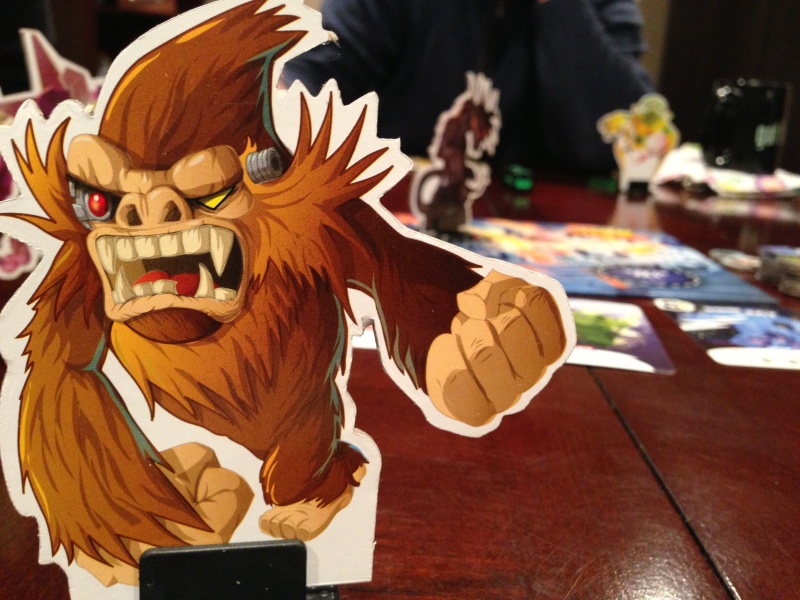
Game Experience:
I had the wrong impression of this game when I first played it. When I saw the box and heard about the theme, I couldn’t wait to take control of the monsters and have the feeling that I’m going through the city destroying everything in my path. Sadly, I didn’t get that feeling at all. The rules state when you earn victory points you are causing destruction to the city. The problem is that this is just because of location on the board rather than doing anything specific in the game. I wish there was a stronger connection between the theme and the board. This brings us to the Tokyo board of the game. As I said before, the artwork on the board is nice, but the functionality of the board is just a placeholder for if you are in or outside the city limits. This could have been done with a small disc or even a token. The board makes it clear who is where, but doesn’t add anything to the game besides just something nice to look at while playing.
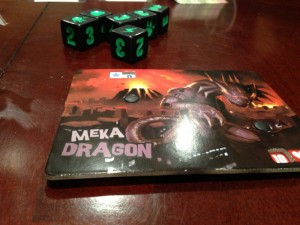
The other issue I have is the lack of any differentiation between the six monsters that come in the game. Thematically, it doesn’t make sense for the Mega Dragon to do the same things as the Alienoid monster. There should be special abilities and disadvantages that are unique to only those specific monsters. If each monster was able to be different and have special things that they could do, it would improve the game play by adding a lot more variety to the game. There is an expansion that does this, Power Up!, but I feel that this needed to be in the main edition of the game. Now that I have heaped tons of negativity, lets move on to what I do like about the game.
I did enjoy my time playing the game. There was a nice amount of variability on what to do when the dice were rolled. With King of Tokyo you have a lot of ways you can play the game. Do you go for attack, heal, try to go for victory points or earn some energy cubes to gain that good card on the table? We had quite a bit of tension as we were rolling the dice for the last times on our turns. Everyone would watch with anticipation to see if the other player could get the side of the dice they needed.
Due to the game being only a dice rolling game, there is a lot of luck involved, but that didn’t bother me much. When I have had issues with dice games is when I have to roll a certain number and if I don’t, I have to sit there and twiddle my thumbs waiting for my next turn. Because of the four different actions that you can gain from rolling the dice, there are always things you can do with your roll. This allows for players that don’t get the dice to do their bidding to still have things to do on their turn.
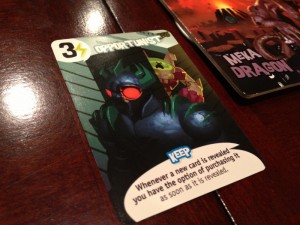
I found the king of the hill aspect of the game to be an interesting mechanic. By having at least one player in the city at a time, it allowed for a lot of player interaction. It also forced people to get involved with the action, fighting wise. If they didn’t have this part of the game people could sit by and just try to roll for victory points and not involve themselves with anyone else. Anyone can move into the city if they get an attack symbol on their dice at the end of their rolls. Even passive players will be forced into the action by the randomness of die rolls. After playing I don’t think there is a way to just be on the offensive or just sit back to win this game. You need timely dice rolls and are able to take advantage of situations to succeed in this game.
Final Thoughts:
I wanted this game to be more than it was. Something that put me in the same shoes as these gigantic monsters as they conquered a city. I was hoping to bring back my childhood days as I destroyed buildings in the video game Rampage. But the game isn’t that. If you look beyond that and look at the game for what it truly is, a heavy filler game, it was quite an enjoyable experience. The varied actions on each turn allow even a bad dice roll to keep a player in the game. The game comes with some great component and is beautifully illustrated. The level of player interaction does allow everyone to join in the fun. I think with the right gaming group (in the right mood), you could have a lot of fun with King of Tokyo. But at the end of the day, it’s just not the deepest experience in gaming. Still, there is lot of fun to be had in King of Tokyo and I would give it another play if asked. I was just hoping for more buildings to smash.
If you are interested in getting a copy for yourself, it’s about $32
Final Score: 3 Stars – A light dice rolling game that, despite it’s lack of depth, is fun to play.
 Hits:
Hits:
• Easy to learn rules
• A nice amount of player interaction
• Varied actions on each dice roll
Misses:
• Lack of variability in the monsters
• Gaining victory points isn’t satisfying
• Could use more tie in between the theme and the game board




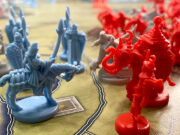
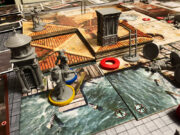















I found King of Tokyo extremely boring. Pretty subpar monster game and not really up to par with a lot of other party games.
For a game about being King of Tokyo… nobody actually wants to be in Tokyo. It’s just suicide. And I agree that you don’t feel like you’re rampaging through the city and destroying things at all. I just feel like I’m rolling dice over and over.
A game about giant monsters slugging it out, each with special powers and abilities and destroying armies and cities is an old 80’s boardgame called Gammarauders.
If you can grab it and it’s expansion (Gammasaurus) it’ll probably scratch your itch for piloting a Giant Hamster or a mechanical T-Rex to victory. Really good game.
I think you must give a try to King Of New York. =P
Just the visual of it in the table is very cool.